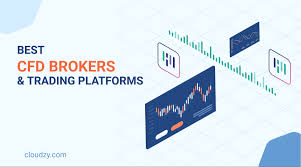Best CFD Trading Reviews: Discovering the Right Broker for Your Needs
If you’re interested in the dynamic world of online trading, understanding Contracts for Difference (CFDs) is essential. Choosing the best broker can significantly impact your trading experience and success. In our comprehensive analysis, we bring you best cfd trading reviews bestbrokercfd.com reviews of the top CFD trading platforms available today.
What Are CFDs?
Contracts for Difference (CFDs) represent a financial agreement between two parties, typically referred to as the buyer and the seller. The purpose of a CFD is to exchange the difference between the opening and closing prices of the asset, without the need to own the underlying asset itself. This financial derivative allows traders to speculate on price movements of various assets, including stocks, commodities, indices, and forex.
Benefits of Trading CFDs
- Leverage: CFDs allow traders to access a larger position with a smaller amount of capital. This high leverage can lead to significant gains, but it also increases the risk of losses.
- Diverse Options: CFDs cover a wide range of assets, providing traders with the opportunity to diversify their portfolios.
- No Ownership Required: With CFDs, you can speculate on price changes without the need to take physical ownership of the asset.
- Long and Short Positions: Traders can go long or short, meaning they can profit from both rising and falling markets.
Factors to Consider When Choosing a CFD Broker
Selecting the right broker is crucial to your trading success. Here are some important factors to consider:
1. Regulation and Safety
Ensure that the broker is regulated by a reputable financial authority. This adds a level of safety and protects your investments.
2. Trading Platform
The trading platform should be user-friendly and equipped with the tools needed for effective trading. Look for platforms that offer customizable charts, analysis tools, and real-time data.
3. Commissions and Fees
Different brokers have varying fee structures, including spreads, commissions, and overnight fees. Understanding these costs will help you choose a broker that aligns with your trading strategy.
4. Leverage and Margin Requirements
Review the leverage options and margin requirements offered by brokers. While high leverage can amplify returns, it also increases risk.
5. Customer Support and Education Resources
Good customer support is essential, especially for beginners. Look for brokers that provide educational resources like webinars, articles, and tutorials.
Top CFD Brokers Reviewed
Here’s a brief overview of some of the best CFD brokers currently available:

1. eToro
eToro is known for its user-friendly platform and social trading features. Traders can follow and copy strategies from successful investors, making it ideal for beginners.
2. IG Group
IG Group offers a comprehensive trading platform with a wide array of CFDs and extensive educational tools. They are well-regulated and provide competitive pricing.
3. Plus500
Plus500 is popular for its intuitive trading interface and offers a generous demo account. It’s great for both beginners and experienced traders.
4. CMC Markets
CMC Markets offers a powerful trading platform and a vast selection of CFDs. They provide low spreads and excellent market research resources.
5. OANDA
OANDA stands out for its reliable execution and market data. The broker is highly regarded for its educational content and has a strong focus on customer support.
Common Strategies for Trading CFDs
Here are some effective trading strategies you might consider:
1. Day Trading
This strategy involves buying and selling positions within the same trading day. Day traders aim to capitalize on short-term market fluctuations.
2. Swing Trading
Swing traders hold positions for several days to weeks, looking to profit from short- to medium-term price movements.
3. Scalping
Scalping is a high-speed trading strategy where traders make dozens or hundreds of trades in a day, aiming for small profits on each trade.
4. Trend Following
Trend following involves identifying and trading in the direction of the market trend. Traders can use technical analysis to spot trends and enter or exit positions accordingly.
Conclusion
Choosing the right CFD broker is fundamental to your trading success. By exploring the insights and reviews provided in this guide, you can make an informed decision that aligns with your trading goals. Always remember to practice good risk management and stay updated with market trends to navigate the ever-changing landscape of CFD trading successfully.
